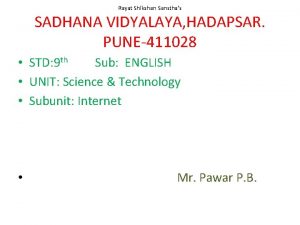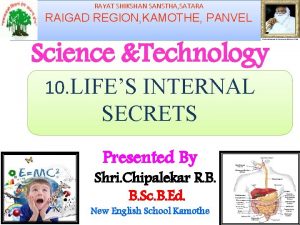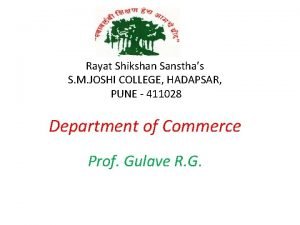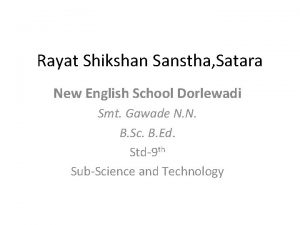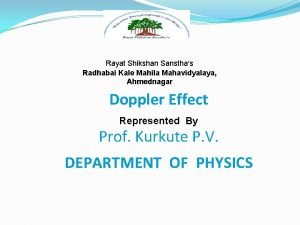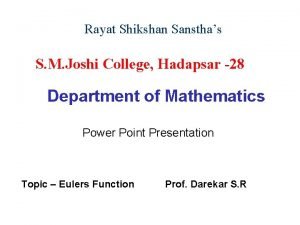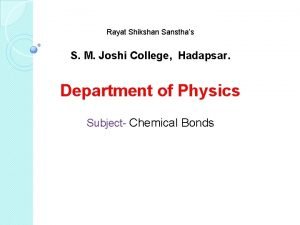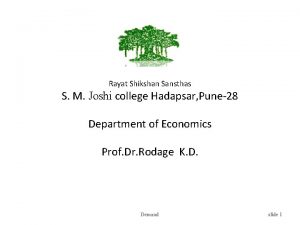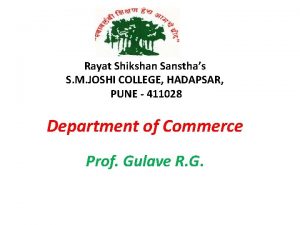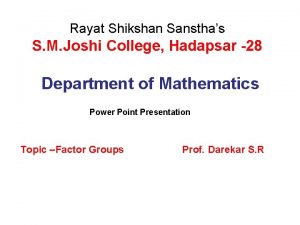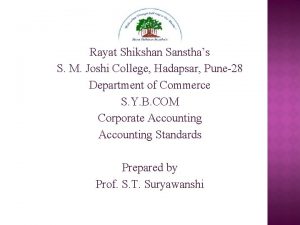Rayat Shikshan Sansthas S M JOSHI COLLEGE HADAPSAR
















- Slides: 16

Rayat Shikshan Sanstha’s S. M. JOSHI COLLEGE, HADAPSAR, PUNE - 411028 Department of Commerce Prof. Gulave R. G.

CLASSIFICATION OF COST Ø Ø Ø Elements Behavior Functions Normality Control Decision Making

Elements • MATERIAL • LABOUR • EXPENSES

MATERIAL • Direct: traceable to one particular process, job or product – identified with each unit of product • Example: manufacturing an apparel • Cloth, collar, buttons, cufflinks, thread Primary packing material (e. g. , carton, wrapping, cardboard, boxes, etc. ) • Fuel, lubricating oil etc for operating & maintenance of machine • Small tools • Materials used for repairs & maintenance

LABOUR • • Inspectors Supervisors Internal transport staff Storekeeper, maintenance staff

EXPENSES • • Expenses leading to a job or contract Traveling expenses for negotiation Special pattern, design Special tools for executing the contract • Rent • Insurance • Canteen, hospital, power , lighting, maintenance

Behavior Fixed in short run & long run Variable Varies with volume and constant per unit Semi-variable A cost could be variable for one level of activity whereas it could be fixed for another. Not inherently fixed or variable Many costs are semi-variable in nature

Functions • • Production Cost Administration Cost Selling Cost Distribution Cost

Normality • Normal • Abnormal

Controllable & Uncontrollable

Planning & Control • Budgeted Cost: estimate of expenditure for different business operations • Standard Cost: for prescribed set of operating conditions, labour, material and overheads are predetermined; budget translated into actual operation through standard costs

Decision Making • Marginal vs. Absorption Costing (with fixed cost and without FC) • Sunk - irrelevant • Committed – pre committed • Opportunity • Incremental / Differential • Avoidable & Unavoidable • controllable / uncontrollable

Relevance • Relevant • Irrelevant

Cont…. . • Irrelevant cost: not relevant for decision making • Example: Sunk costs: Sunk cost is the cost of abandoned plant less salvage value. Not relevant for decision making. • Imputed (Notional cost): Actually not incurred (interest on own capital, rent on owned building, etc. ) Taken into account in capital budgeting decisions. • Replacement cost: Cost of replacing at current market price.

Cont…. . • Avoidable and unavoidable cost: Cost that can be avoided by eliminating a product or department is avoidable and that which cannot be, is unavoidable. Ex. – Rent of factory is unavoidable if a product is discontinued.

Other costs: • Future costs: cost to be incurred in future • Programmed cost: Cost incurred as per policy of top management. Ex. - Donation to charity. • Joint cost: cost of joint or by-products incurred before separation, which cannot be traced to particular products. • Conversion cost: cost of converting raw material to finished goods = Production cost- direct material. • Discretionary cost: not essential for decision on hand. Ex. Training expenses of workers, R&D cost. • Committed cost: Costs incurred due to past decisions and are not within control in the short run at present. Ex. - Depreciation on Plant, Rent, etc.
 Rayat shikshan sanstha sadhana vidyalaya hadapsar
Rayat shikshan sanstha sadhana vidyalaya hadapsar Sadhana vidyalaya hadapsar
Sadhana vidyalaya hadapsar Rayat shikshan sanstha sadhana vidyalaya hadapsar
Rayat shikshan sanstha sadhana vidyalaya hadapsar Sm joshi college hadapsar
Sm joshi college hadapsar Red rose
Red rose Rayat shikshan sanstha kamothe
Rayat shikshan sanstha kamothe Apollonius theorem
Apollonius theorem Rayat shikshan sanstha loni
Rayat shikshan sanstha loni Rayat shikshan sanstha motto
Rayat shikshan sanstha motto Education through self help is our motto
Education through self help is our motto S m joshi college
S m joshi college Sm joshi college
Sm joshi college S.m.joshi college uniform
S.m.joshi college uniform Dr kurkute hadapsar
Dr kurkute hadapsar Sadhana kanya vidyalaya hadapsar
Sadhana kanya vidyalaya hadapsar Shikshan mandal karad
Shikshan mandal karad Mpasc.rayat.dc
Mpasc.rayat.dc
